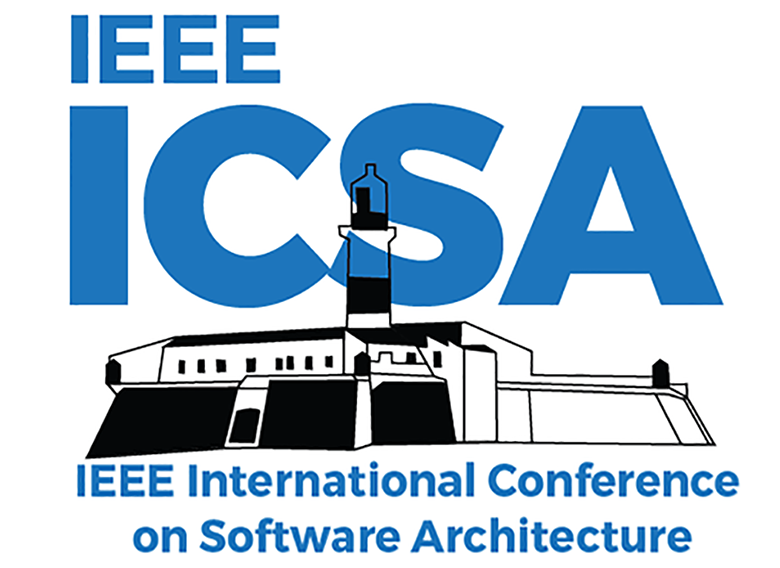Download the ICSA Software Architecture in Practice (SAIP) CFP here.
The ICSA Software Architecture in Practice (SAIP) Track provides practitioners and researchers a platform to present and discuss recent innovations and findings in the field of software architecture by means of experience reports and talks.
Topics
We welcome submissions covering any topic that is relevant for software architecture in practice. Examples of topics are listed below.
- Event-driven architectures and reactive systems
- Microservice architectures
- Serverless architectures and Function as a Service (FaaS)
- Design consideration for containerization and container orchestration
- Design of Internet of Things solutions and mobile apps
- Architecture of solutions involving data-analytics and artificial intelligence
- Design considerations for DevOps and deployability practices
- The architecture practice in fast-moving, agile environments, with independent self-organizing teams
- Addressing quality attribute requirements, such as performance, availability, usability, security, and interoperability
- Technical debt management
- Software architecture design, evaluation, documentation, conformance, and reconstruction
Important Dates (AoE)
- Abstracts (mandatory) due: January 8th, 2020 ✔
- Papers due: January 13th, 2020 ✔
- Paper notification: February 1st, 2020 ✔
- Camera-ready due:
February 10th, 2020February 21th, 2020
Types of Submissions
We solicit the following types of submissions:
- SW Architecture in Practice papers (4-8 pages): address real-world software architecture challenges through systematic investigations. Papers should describe industry-relevant experiences and best practices. Application of new ideas in industry and government settings with a thorough discussion of results and lessons learned are welcomed. Empirical analyses of software architecture issues may help both practitioners and researchers. The evaluation criteria for submissions include potential impact, repeatability, and real-world focus. All papers accepted in this track will be published in the companion proceedings.
- Technical talk proposals (2 pages): must feature current trends in the industry on the practice of software architecture presenting ideas that are both inspirational and informative. Proposals should make clear why the talk is interesting to ICSA SAIP attendees. The duration of accepted talks is 30 minutes. Extended abstracts of the accepted talks will appear in the ICSA Companion proceedings.
Formatting and Submission Instructions
All submissions must conform to the Author Instructions. No double-blind, but single-blind review will apply to SAIP papers. Papers and talk proposals must be submitted electronically via the EasyChair submission system. Papers must not have been published before.
Publication and Attendance
All accepted contributions will be published in the ICSA 2020 Companion proceedings, and appear in the IEEE Xplore Digital Library. At least one author of an accepted contribution is required to register and present the work at the conference.
Organization
For more information please contact the SAIP Track chair through the Easychair address: icsa2020saip@easychair.org
- Matthias Naab (Fraunhofer IESE, Germany)
Program Commitee
- Jan Bosch, Chalmers University of Technology
- Eric Bouwers, Squla
- Frank Buschmann, Siemens AG
- Bruno Costa, Federal Institute of Education, Science and Technology of Rio de Janeiro (IFRJ)
- Remco De Boer, ArchiXL
- George Fairbanks, Google
- Thomas Goldschmidt, ABB Corporate Research
- Volker Gruhn, Universität Duisburg-Essen
- Wilhelm Hasselbring, Kiel University
- Anton Jansen, Philips Innovation Services
- Jens Knodel, Caruso GmbH
- Heiko Koziolek, ABB Corporate Research
- Michael Kuperberg, Deutsche Bahn AG
- Paulo Merson, Brazilian Federal Court of Accounts (TCU)
- Matthias Naab, Fraunhofer
- Dominik Rost, Fraunhofer
- Antonino Sabetta, SAP Labs
- Magnus Standar, Ericsson
- Eoin Woods, Artechra
- Olaf Zimmermann, HSR FHO
- Klaus-Benedikt Schultis, Siemens AG
